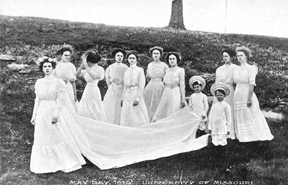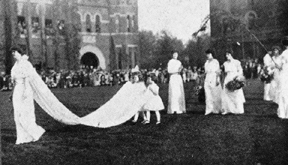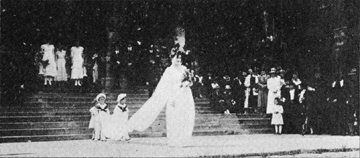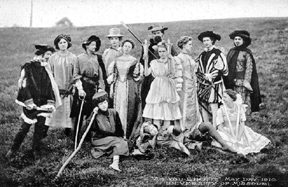May Day At Mizzou
The May Queen
The tradition of the May Queen originated when May Day was still an agricultural holiday. At that time, the queen was selected from among the single women of the village and was said to, "rule the crops until harvest."

1910 May Queen and her attendants
(University Archives, C:0/46/7, Box 1, F9)

1914 May Queen and her entourage on the Quad
(University Archives, Savitar)
At Mizzou, the female students from each of the classes took part in the celebration. Every year one girl from the senior class was chosen as the May Queen. Interestingly, today's beauty pageants may have originated from the coronation of the May Queen.

1918 May Queen
(University Archives, Savitar, 1919)
May Day Plays
An important part of the Mizzou campus May Day celebration was the presentation of plays.

May Day Players
(University Archives, C:0/46/7, Box 1, FF 9, Pg2, A)
Since May Day at Mizzou was exclusively celebrated by women, look closely at this 1910 photo of actors in "As You Like It." Even the male characters are played by women.
The End of a Tradition
Over the years, May Day lost its importance and celebration of the holiday slowly diminished. By the 1920s, May Day celebrations at Mizzou also died out, but the reason for this is unclear. In the twentieth century, international labor organizations chose May 1st as their day and this association may have irrevocably altered the nature of May Day celebrations. The onset of the Great Depression also gave people fewer reasons to celebrate. Yet, these photographs preserve one of the earliest traditions by, for, and about women at Mizzou.
Sources consulted include: Every Day at the University of Missouri, Chasnoff, Joseph; Savitars; "The Origins and Traditions of May Day," http://www.geocities.com/CapitolHill/5202/mayday.html; "The Pagan Origins of May Day," http://www.planet.net.au/innovations/may96/mayday.html; William Bennett, History of Burnley.
